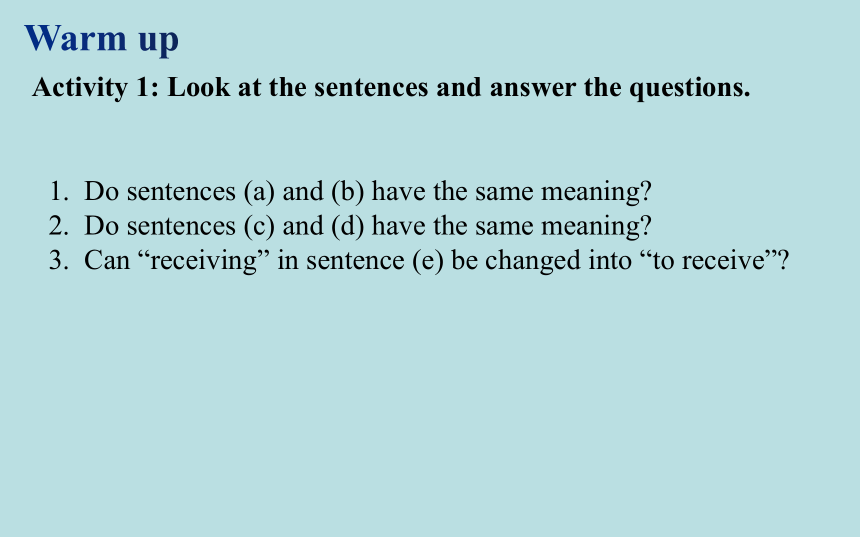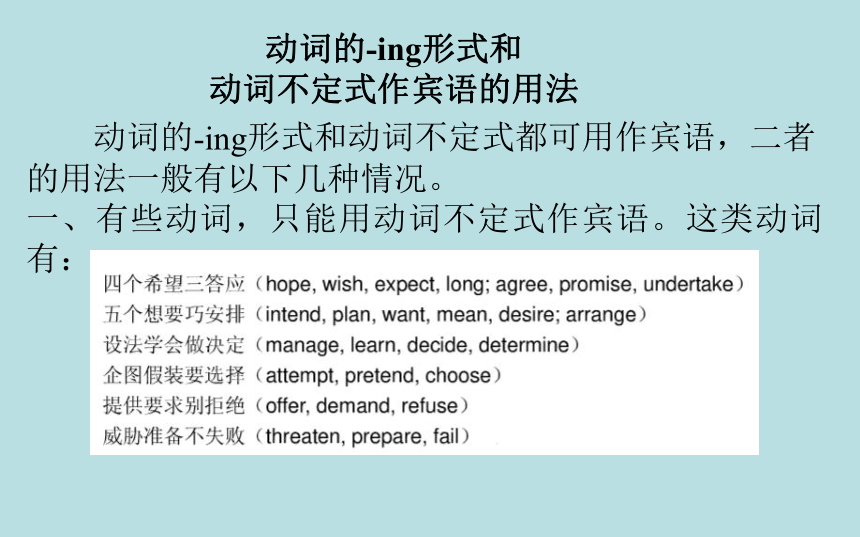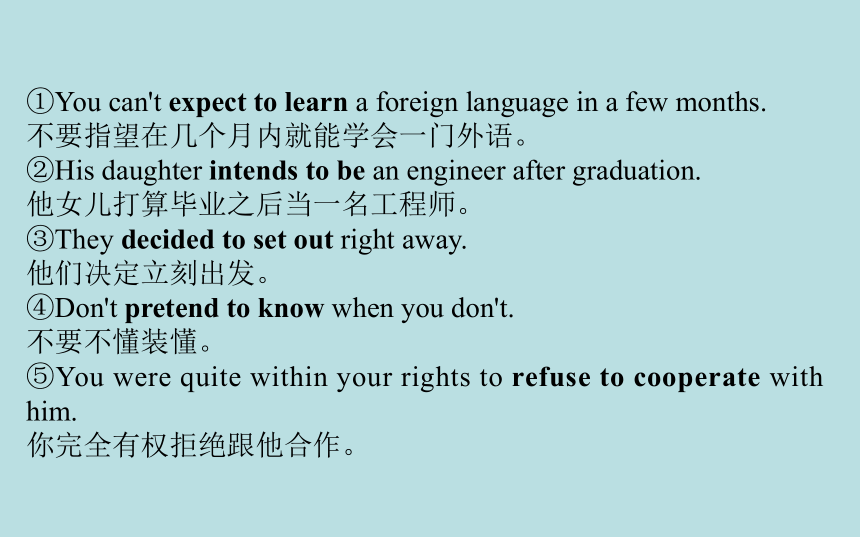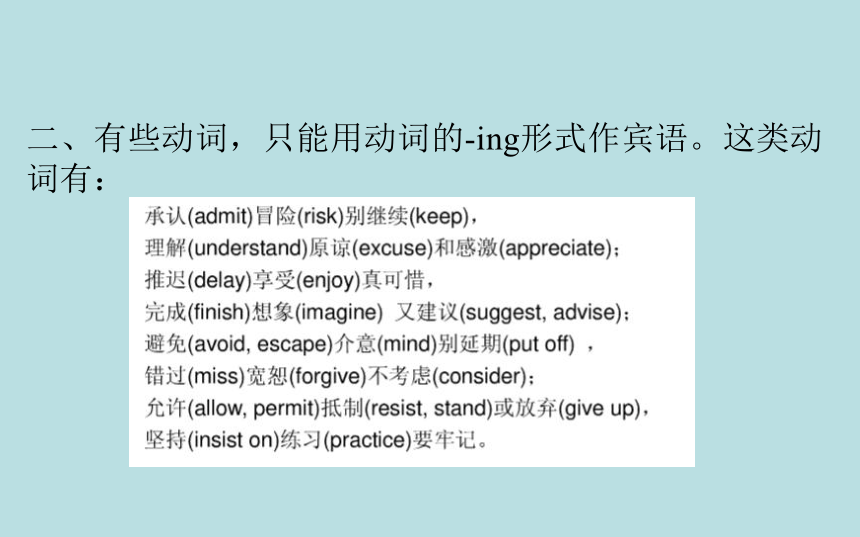外研版(2019)选择性必修 第一册Unit2 Onwards and upwards Using language课件(共16张PPT)
文档属性
| 名称 | 外研版(2019)选择性必修 第一册Unit2 Onwards and upwards Using language课件(共16张PPT) |  | |
| 格式 | zip | ||
| 文件大小 | 473.5KB | ||
| 资源类型 | 教案 | ||
| 版本资源 | 外研版(2019) | ||
| 科目 | 英语 | ||
| 更新时间 | 2022-08-27 11:50:53 | ||
图片预览







文档简介
(共16张PPT)
Unit 2 Onwards and upwards
Using language
Grammar:动词的-ing形式和
动词不定式作宾语的用法
Activity 1: Look at the sentences and answer the questions.
Warm up
Activity 1: Look at the sentences and answer the questions.
Warm up
1. Do sentences (a) and (b) have the same meaning
2. Do sentences (c) and (d) have the same meaning
3. Can “receiving” in sentence (e) be changed into “to receive”
动词的-ing形式和
动词不定式作宾语的用法
动词的-ing形式和动词不定式都可用作宾语,二者的用法一般有以下几种情况。
一、有些动词,只能用动词不定式作宾语。这类动词有:
①You can't expect to learn a foreign language in a few months.
不要指望在几个月内就能学会一门外语。
②His daughter intends to be an engineer after graduation.
他女儿打算毕业之后当一名工程师。
③They decided to set out right away.
他们决定立刻出发。
④Don't pretend to know when you don't.
不要不懂装懂。
⑤You were quite within your rights to refuse to cooperate with him.
你完全有权拒绝跟他合作。
二、有些动词,只能用动词的-ing形式作宾语。这类动词有:
①She admitted having driven the car without insurance.
她供认驾驶了这辆没有保险的轿车。
②He delayed telling her the news, waiting for the right moment.
他没有马上把消息告诉她,等有了适当的时机再说。
③She couldn't imagine living in a place like that.
她无法想象住在那样一个地方。
④Would you mind waiting outside for a moment
您不介意在外面等一会吧?
⑤The bank strongly resisted cutting interest rates.
银行强烈反对降低利率。
三、有些动词,既能用动词的-ing形式,也能用动词不定式作宾语。
(一)一些表示喜好的动词,如like, love, hate, prefer 等,以及begin, start, continue, bother, cease等,用-ing形式作宾语和用不定式作宾语,意义差别不大。
① My sisiter likes singing/to sing. 我妹妹喜欢唱歌。
② Jane started working/to work in Beijing two years ago. 简两年前开始在北京工作。
③Danny prefers spending/to spend his summer holiday in the countryside. 丹尼更喜欢在乡下过暑假。
(二)而另外一些动词,用-ing形式作宾语和用不定式作宾语,意义则完全不同。常见的这一类动词有:
◇remember doing sth 记得做过某事(已经做了)
remember to do sth 记得去做某事(还未做)
◇forget doing sth 忘记做过某事(已经做了)
forget to do sth 忘记去做某事(还未做)
◇regret doing sth 对已经做过的事感到后悔
regret to do sth 对将要做的事表示遗憾
◇try doing sth 尝试做某事
try to do sth 设法、试图做某事
◇mean doing sth 意味着做某事
mean to do sth 打算做某事
◇stop doing sth 停止做某事
stop to do sth 停止正在做的事,去做另外一件事(注意:这里的to do不是stop的宾语,而是stop的目的状语)
◇go on doing sth 继续做同一件事
go on to do sth 做完一件事之后,接着去做另外一件事
①Remember to buy a gift for our daughter on your way back home! 回家路上,记得给女儿买个礼物啊!
②I remember taking the book with me, but it isn't in my bag.
我记得带了那本书啊,但是我书包里并没有。
③Please go on doing the same exercise.
请接着做这同一个练习。
④I don't regret telling her what I thought.
我并不后悔告诉了她我的想法。
⑤Unless you try to do something beyond what you have already mastered, you will never grow.
只有去尝试做一些你不熟悉的事情,你才能有所成长。
四、动词的-ing形式作介词 to 的宾语。常见的带介词to的动词和动词短语有:
①Working people everywhere object to paying taxes.
各地的工薪族都反对缴税。
②There's not much time left. Let's get down to repairing the machine. 时间所剩不多了,让我们开始修理这台机器吧。
③Reporters should stick to investigating the facts.
记者应坚持调查事实。
④I'm accustomed to having breakfast every morning.
我已经习惯了每天吃早餐。
⑤ What you are doing will contribute to revitalizing the basic education.你们所做的将会极大地推动基础教育的发展。
用所给动词的适当形式填空。
① Robert is indeed a wise man. How often I have regretted ________ (not take) his advice!
② We will never fail ________ (live up) to what our parents expect of us.
③ The flowers need ____________________ (water).
④ Do you really enjoy ___________ (play) the violin every day
⑤ I can't stand ________ (sit) and ________ (do) nothing.
【巩固练习】
not taking
to live up
watering/to be watered
playing
sitting
doing
⑥ We meant _________ (give) our mother a surprise last night, but she worked overtime.
⑦ If you want to improve your oral English, you must practice _________ (speak) it as often as you can.
⑧ I had seriously considered _______ (tell) the story from the point of view of a child.
⑨ Both the husband and wife attempt ________ (take) control of the company.
⑩ Try __________ (become) a man of value.
【巩固练习】
to give
speaking
telling
to take
to become
Thank you!
Unit 2 Onwards and upwards
Using language
Grammar:动词的-ing形式和
动词不定式作宾语的用法
Activity 1: Look at the sentences and answer the questions.
Warm up
Activity 1: Look at the sentences and answer the questions.
Warm up
1. Do sentences (a) and (b) have the same meaning
2. Do sentences (c) and (d) have the same meaning
3. Can “receiving” in sentence (e) be changed into “to receive”
动词的-ing形式和
动词不定式作宾语的用法
动词的-ing形式和动词不定式都可用作宾语,二者的用法一般有以下几种情况。
一、有些动词,只能用动词不定式作宾语。这类动词有:
①You can't expect to learn a foreign language in a few months.
不要指望在几个月内就能学会一门外语。
②His daughter intends to be an engineer after graduation.
他女儿打算毕业之后当一名工程师。
③They decided to set out right away.
他们决定立刻出发。
④Don't pretend to know when you don't.
不要不懂装懂。
⑤You were quite within your rights to refuse to cooperate with him.
你完全有权拒绝跟他合作。
二、有些动词,只能用动词的-ing形式作宾语。这类动词有:
①She admitted having driven the car without insurance.
她供认驾驶了这辆没有保险的轿车。
②He delayed telling her the news, waiting for the right moment.
他没有马上把消息告诉她,等有了适当的时机再说。
③She couldn't imagine living in a place like that.
她无法想象住在那样一个地方。
④Would you mind waiting outside for a moment
您不介意在外面等一会吧?
⑤The bank strongly resisted cutting interest rates.
银行强烈反对降低利率。
三、有些动词,既能用动词的-ing形式,也能用动词不定式作宾语。
(一)一些表示喜好的动词,如like, love, hate, prefer 等,以及begin, start, continue, bother, cease等,用-ing形式作宾语和用不定式作宾语,意义差别不大。
① My sisiter likes singing/to sing. 我妹妹喜欢唱歌。
② Jane started working/to work in Beijing two years ago. 简两年前开始在北京工作。
③Danny prefers spending/to spend his summer holiday in the countryside. 丹尼更喜欢在乡下过暑假。
(二)而另外一些动词,用-ing形式作宾语和用不定式作宾语,意义则完全不同。常见的这一类动词有:
◇remember doing sth 记得做过某事(已经做了)
remember to do sth 记得去做某事(还未做)
◇forget doing sth 忘记做过某事(已经做了)
forget to do sth 忘记去做某事(还未做)
◇regret doing sth 对已经做过的事感到后悔
regret to do sth 对将要做的事表示遗憾
◇try doing sth 尝试做某事
try to do sth 设法、试图做某事
◇mean doing sth 意味着做某事
mean to do sth 打算做某事
◇stop doing sth 停止做某事
stop to do sth 停止正在做的事,去做另外一件事(注意:这里的to do不是stop的宾语,而是stop的目的状语)
◇go on doing sth 继续做同一件事
go on to do sth 做完一件事之后,接着去做另外一件事
①Remember to buy a gift for our daughter on your way back home! 回家路上,记得给女儿买个礼物啊!
②I remember taking the book with me, but it isn't in my bag.
我记得带了那本书啊,但是我书包里并没有。
③Please go on doing the same exercise.
请接着做这同一个练习。
④I don't regret telling her what I thought.
我并不后悔告诉了她我的想法。
⑤Unless you try to do something beyond what you have already mastered, you will never grow.
只有去尝试做一些你不熟悉的事情,你才能有所成长。
四、动词的-ing形式作介词 to 的宾语。常见的带介词to的动词和动词短语有:
①Working people everywhere object to paying taxes.
各地的工薪族都反对缴税。
②There's not much time left. Let's get down to repairing the machine. 时间所剩不多了,让我们开始修理这台机器吧。
③Reporters should stick to investigating the facts.
记者应坚持调查事实。
④I'm accustomed to having breakfast every morning.
我已经习惯了每天吃早餐。
⑤ What you are doing will contribute to revitalizing the basic education.你们所做的将会极大地推动基础教育的发展。
用所给动词的适当形式填空。
① Robert is indeed a wise man. How often I have regretted ________ (not take) his advice!
② We will never fail ________ (live up) to what our parents expect of us.
③ The flowers need ____________________ (water).
④ Do you really enjoy ___________ (play) the violin every day
⑤ I can't stand ________ (sit) and ________ (do) nothing.
【巩固练习】
not taking
to live up
watering/to be watered
playing
sitting
doing
⑥ We meant _________ (give) our mother a surprise last night, but she worked overtime.
⑦ If you want to improve your oral English, you must practice _________ (speak) it as often as you can.
⑧ I had seriously considered _______ (tell) the story from the point of view of a child.
⑨ Both the husband and wife attempt ________ (take) control of the company.
⑩ Try __________ (become) a man of value.
【巩固练习】
to give
speaking
telling
to take
to become
Thank you!
